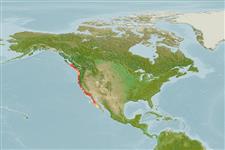Teleostei (teleosts) >
Perciformes/Scorpaenoidei (Scorpionfishes) >
Sebastidae (Rockfishes, rockcods and thornyheads) > Sebastinae
Etymology: Sebastes: Greek, sebastes = august, venerable (Ref. 45335); goodei: Named after Dr. G.B. Goode, U.S. ichthyologist (Ref. 6885).
Eponymy: Dr George Brown Goode (1851–1896) was an American ichthyologist and museum administrator at the Smithsonian. [...] (Ref. 128868), visit book page.
More on authors: Eigenmann & Eigenmann.
Environment: milieu / climate zone / depth range / distribution range
Ecology
Marine; brackish; demersal; depth range 0 - 425 m (Ref. 6793). Temperate; 52°N - 24°N, 131°W - 110°W
Eastern Pacific: Queen Charlotte Sound, British Columbia, Canada to Magdalena Bay, Baja California Sur, Mexico.
Length at first maturity / Size / Weight / Age
Maturity: Lm 32.0, range 29 - 39 cm
Max length : 56.0 cm TL male/unsexed; (Ref. 2850); max. published weight: 1.5 kg (Ref. 40637); max. reported age: 35 years (Ref. 56049)
Dorsal spines (total): 13; Dorsal soft rays (total): 13 - 16; Anal spines: 3; Anal soft rays: 7 - 9; Vertebrae: 26. Head spines very weak - preoculars present, nasal, supraocular and parietal spines usually absent, postocular, tympanic, coronal and nuchal spines absent; chin projects outward; preopercular spines fairly strong; anal fin small and rear edge slanted posteriorly, 2nd anal spine short; body slender (Ref. 27437). Caudal fin moderately indented (Ref. 6885). Pinkish red to copper pink, white ventrally; lateral line in bright red zone; caudal fin dusky (Ref. 27437).
Adults frequent deep rocky reefs as well as sand and mud bottoms; young are pelagic (Ref. 36715) and occur in shallower waters (Ref. 2850). Feed on euphausiids (Ref. 6885), krill, small squids and fishes (Ref. 2850). Viviparous, with planktonic larvae (Ref. 36715). Marketed fresh and frozen; eaten fried, boiled, microwaved and baked (Ref. 9988).
Eschmeyer, W.N., E.S. Herald and H. Hammann, 1983. A field guide to Pacific coast fishes of North America. Boston (MA, USA): Houghton Mifflin Company. xii+336 p. (Ref. 2850)
IUCN Red List Status (Ref. 130435: Version 2024-1)
Threat to humans
Harmless
Human uses
Fisheries: commercial; gamefish: yes
Tools
Special reports
Download XML
Internet sources
Estimates based on models
Preferred temperature (Ref.
123201): 7 - 9.7, mean 8.2 °C (based on 39 cells).
Phylogenetic diversity index (Ref.
82804): PD
50 = 0.5000 [Uniqueness, from 0.5 = low to 2.0 = high].
Bayesian length-weight: a=0.01000 (0.00495 - 0.02022), b=3.09 (2.92 - 3.26), in cm total length, based on LWR estimates for this Genus-body shape (Ref.
93245).
Trophic level (Ref.
69278): 3.5 ±0.44 se; based on food items.
Resilience (Ref.
120179): Medium, minimum population doubling time 1.4 - 4.4 years (K=0.24; tm=4; tmax=27; Fec=29,000).
Prior r = 0.28, 95% CL = 0.19 - 0.42, Based on 2 full stock assessments.
Fishing Vulnerability (Ref.
59153): Moderate to high vulnerability (52 of 100).
Climate Vulnerability (Ref.
125649): Low to moderate vulnerability (27 of 100).
Nutrients (Ref.
124155): Calcium = 23.4 [8.5, 73.8] mg/100g; Iron = 0.242 [0.103, 0.603] mg/100g; Protein = 18.2 [16.9, 19.4] %; Omega3 = 1.34 [0.55, 3.24] g/100g; Selenium = 40.2 [14.5, 117.3] μg/100g; VitaminA = 18.4 [7.4, 48.4] μg/100g; Zinc = 0.429 [0.226, 0.756] mg/100g (wet weight);
